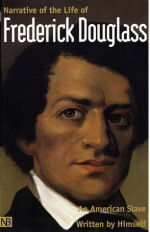 One of the greatest biographies ever written is Frederick Douglas’ Narrative Life. If every American was required to read just the first 10 pages of this book, all our conversations about race would take a more respectful tone. Born in Maryland, he was taken from his mother at birth and given to an older woman. His mother was loaned out to another farm six miles away – this was to prevent them from forming an attachment. He only remembers being with his mother a few times, and then only at night. She had, on two or three occasions before her death, risked coming to lay with him for a few hours at night. She was dead a long while before he ever found out. His father was the master of the plantation.
One of the greatest biographies ever written is Frederick Douglas’ Narrative Life. If every American was required to read just the first 10 pages of this book, all our conversations about race would take a more respectful tone. Born in Maryland, he was taken from his mother at birth and given to an older woman. His mother was loaned out to another farm six miles away – this was to prevent them from forming an attachment. He only remembers being with his mother a few times, and then only at night. She had, on two or three occasions before her death, risked coming to lay with him for a few hours at night. She was dead a long while before he ever found out. His father was the master of the plantation.
As a boy, he was taught to read by the young wife of his master. She read aloud to the children from the Bible, and he wanted to read the Bible for himself. She was so pleased at his wanting to read the Bible that she taught him the alphabet, and how letters work together to make words. After only two or three lessons, the master found out about their classes and was furious. He informed his wife that it was illegal to teach a slave to read, and beyond that, “Learning will ruin the best ***** in the world.”
Will reading the Bible ruin a person? Yes, if by “ruin” you mean “empower,” “enlighten,” “inform.” If you are a person, like a plantation owner, or a Medieval Pope who maintains one’s position by ensuring masses of people are kept regimented, ignorant, and powerless, then yes, learning to read the Bible will ruin all that - which is why it was illegal to teach a slave to read in most slave states, and why Bible translators like Jan Hus and John Wycliffe were so persecuted. And it is why Luther’s declaration at the Diet of Worms, that he recognized no authority of councils and Popes – but of the Word alone, shattered the grip of Rome in a way an army of thousands never could.
The word of God empowers. It Gives light (Psalm 119.105), taking away the darkness which evil men need to hide their evil deeds (John 3.19). The Word of God revives us when we are knocked down (Psalm 119.25). The Word of God keeps us connected to our creator (Psalm 119.73). The Word of God asserts goodness over evil, the truth over the lie (Psalm 119.76). The Word of God turns acts of oppression into the resources of personal growth (Psalm 119.71-72).
The Word of God empowers. A lie can not stand against the knowledge of it. Knowledge of God’s word liberates a person despite the all the evil, torture, and violence evil men can bring to bear. Read of Jesus before Pilate (John 18-19), Stephen before the mob (Acts 7), Paul before Agrippa (Acts 26), and you will see that the person of God, even when shackled and accused, is a person of Power – because God’s Word is power.
And so Medieval Popes, slave owners, and Stalinist dictators have understandably tried to suppress the reading of the Bible. But they have all failed. The Word survives. The Word flourishes. The world is filled with Bibles. In most regions and languages, access is not a problem.
The Word fills the world. Does it fill us? If not, why not? To be filled with the Word is to be filled with power.

